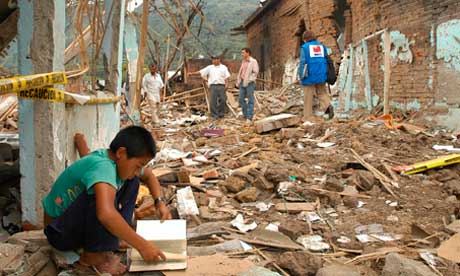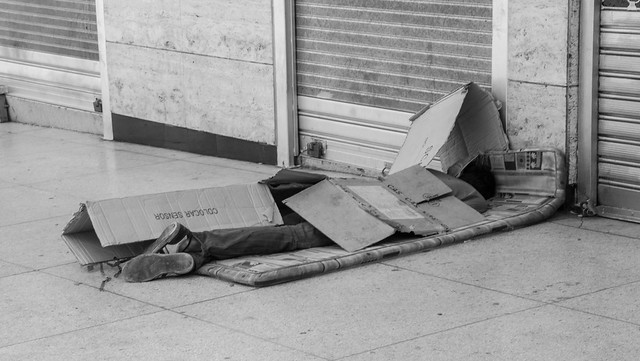Latin America
Related: About this forumBogota city council considers initiative to round up beggars
Bogota city council considers initiative to round up beggars
posted by Taran Volckhausen
Dec 5, 2013
Bogota’s city council is considering a proposal that would grant city police broad powers to combat begging in Colombia’s capital.
The proposal, titled the “Zero Begging” initiative, would authorize police to round up all those begging on the street, delivering them to shelters where they would be placed in community work programs, purportedly aimed at social reintegration, according to local media Radio Santa Fe.
The proposal also takes aim at those who give money to the homeless, through public campaigns influencing people not to give out money to those who beg.
Councilman Hosman Martinez, who supported the proposal, said, “the capital requires a solid structure to eradicate begging and indigence in Bogota.
More:
http://colombiareports.co/bogota-city-council-proposes-round-homeless-war-begging/
[center] 
Concejal Hosman Martínez wants the homeless out of Bogota.



 [/center]
[/center]
Bacchus4.0
(6,837 posts)Judi Lynn
(160,530 posts)Witness for Peace first opened an office in Colombia in 2000, in order to document the human, social, and environmental consequences of Plan Colombia - a multi-billion dollar counter-narcotics and counter-insurgency package for the Colombian armed forces. Plan Colombia was intended to reduce Colombia’s cocaine production and bring peace and stability to the country’s 60-year-old civil war. However, the policy has failed to accomplish either goal. Instead, U.S. aid has made an already dire situation even more precarious.
For more than a decade, Witness for Peace has documented one of the world’s largest humanitarian crises—Colombia is currently the country with the largest internally displaced population in the world. More than 5.2 million Colombians have been internally displaced by right-wing paramilitaries often working in conjunction with Colombia’s U.S. funded and trained military, left-wing insurgents, indiscriminate aerial fumigations, large-scale extractive industries and agro-fuel production. At every turn, U.S. corporations have benefited from the violence and mass displacement, most notably Coca Cola, Chiquita, Dole and Drummond Coal.
More:
http://www.witnessforpeace.org/section.php?id=95
[center] ~ ~ ~[/center]
September 11, 2013
Is the U.S. Enabling the Humanitarian Crisis in Colombia?
Millions remain displaced and war crimes are ongoing, but U.S. military aid keeps flowing.
BY Jeremy Kryt
~snip~
These Nasa families are among the 4.7 million internally displaced Colombians produced by five decades of civil war, according to a recent study by a government-sponsored truth commission called the National Center for Historic Memory. The report revealed that the number of internal refugees in this resource-rich Andean nation is the highest of any country on earth. The struggle between Bogota’s armed forces and right-wing proxy militias and the nation’s largest, leftist insurgency, the Revolutionary Armed Forces of Colombia (FARC), has claimed more than 220,000 lives, 82 percent of them civilians. Untold thousands of native Nasa have also been killed in the world’s longest-running civil war. In the Cauca region alone at least 128 native peoples have been slain in conflict-related violence since the start of 2012.
Peace talks aimed at ending the war with FARC have been dragging on in Havana, Cuba, since last fall. Little progress has been made so far, and the fighting continues apace. At least 48 government troops have been killed in the last two months, and at least 12 insurgents lost their lives to airstrikes in August. August also saw civilians erupt over the root causes of the armed conflict—vast poverty and stark inequality of land ownership. Massive protests aimed at land reform and curtailing economic globalization shook the country. Despite a crackdown on demonstrations by President Juan Manuel Santos, the ongoing protests continue to paralyze shipping and transportation, especially in war-torn rural regions like Cauca.
In spite of its poor track record on human rights, Colombia remains a close regional ally of Washington, and, under the umbrella of the Drug War, receives more military aid than any other nation in the hemisphere. But now, in the wake of the truth commission report and Bogota’s brutal response to the nationwide protests, a growing chorus of international observers contend that U.S. foreign policy—including military aid and trade agreements—could be helping to fuel the violence and contributing to the plights of those caught in the crossfire, like Conda’s displaced Nasa families.
“Free trade agreements, and globalization in general, have winners and losers,” says Adam Isacson, of the Washington Office on Latin America (WOLA), in an interview with In These Times. “When they protest what is being done to them, those on the losing end are often accused of sympathizing with guerrillas, and end up facing a response from Colombia's security forces. The same forces that have been aided and strengthened by many years of U.S. assistance.”
More:
http://inthesetimes.com/article/15475/us_military_aid_and_colombias_human_rights_crisis/
[center] ~ ~ ~[/center]
UN, UK Say Colombia Has Over 4 Million Refugees
News from Colombia | on: Tuesday, 9 November 2010
The British Government yesterday announced that they believe it is likely that Colombia has around 4.5 million internally displaced people, whilst reports in today’s press suggest that the United Nations High Commission for Refugees (UNHCR) now believe that Colombia has more displaced than any other country in the world.
The new British estimate was announced by Foreign Office Minister Jeremy Browne in Parliament yesterday who said that whilst the official figure was only 3.3 million “the real figure is more likely to be around 4.5 million.” Meanwhile, Colombian press is today reporting that the UNHCHR believes Colombia has more people forced from their homes and land by violence than any other country in the world.
However, Colombia’s leading NGO working with displaced people, the Consultancy on Human Rights and Development (CODHES), which publishes detailed research on the issues, says that the true figure is likely closer to 5 million. CODHES director Jorge Rojas yesterday told the press that the country now has more displaced that Afghanistan, the Congo and Iraq – historically some of the countries with the highest number of refugees.
The Colombian authorities have attempted to play down the problem but still admit to just over 3 million displaced people. International organisations have repeatedly accused the Government of not doing enough to prevent people being forced from their homes and not providing sufficient assistance to those who have been displaced.
http://www.justiceforcolombia.org/news/article/832/UN,-UK-Say-Colombia-Has-Over-4-Million-Refugees
Bacchus4.0
(6,837 posts)the people left or were forced out. Not the same as homeless.
Colombia does not have the largest homeless population on earth.
Judi Lynn
(160,530 posts)in the Americas.
You can't just hide the poor.
You stop harming the poor, instead.



